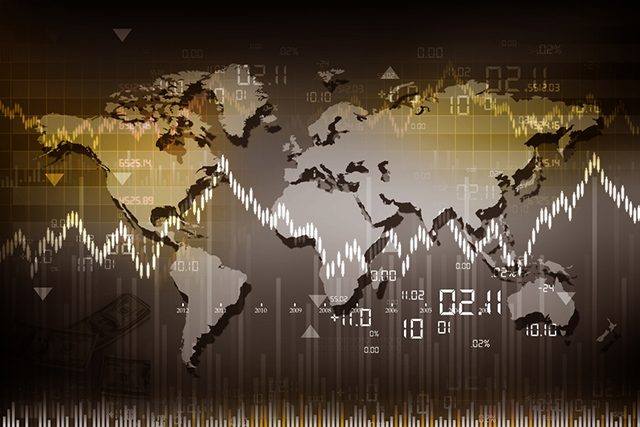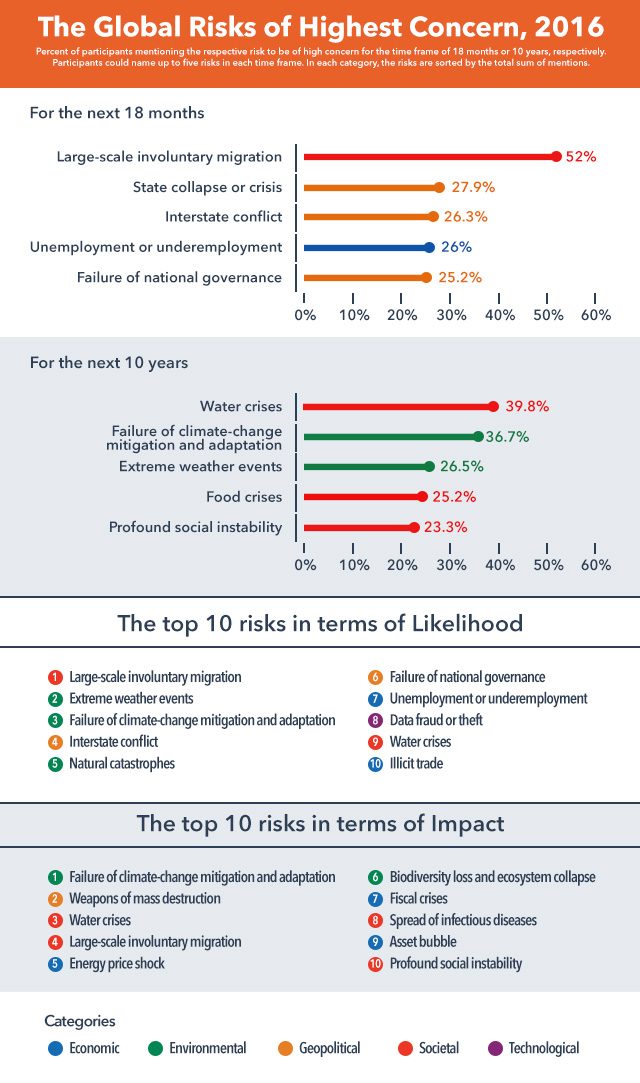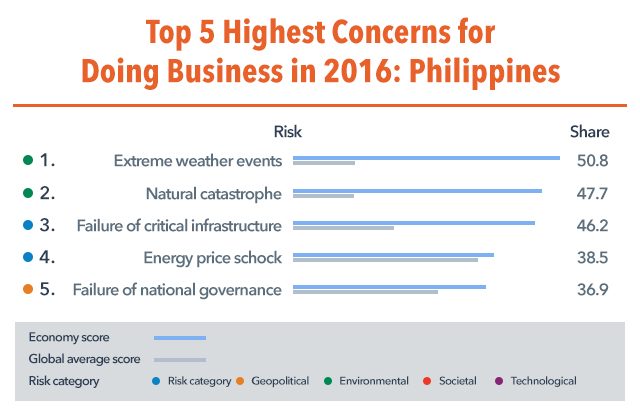SUMMARY
This is AI generated summarization, which may have errors. For context, always refer to the full article.

MANILA, Philippines – Current global trends could see the world facing an uncertain future dominated by fractured states, a volatile global economy, and an increasingly inhospitable climate.
The biggest concern this year is large-scale involuntary migration, followed by state collapse or crisis, according to a new report by the World Economic Forum (WEF) ahead of its annual meeting in Davos, Switzerland this week.
“Without a concerted effort to properly address current trends, the world is at risk of sleepwalking into a future of widening chaos with growing danger of interstate conflict,” said The Global Risks Report 2016, which was presented last Friday, January 15.
The report is based on the findings of almost 750 experts who did a year-long review of 29 global risks, assessing them for likelihood, impact and concern.

Some highlights:
– Environmental concerns have started to take their place at the forefront of people’s minds globally. The WEF noted that this is the first time since the report was published in 2006 that an environmental risk (failure of climate change mitigation and adaption) topped the list of risks in terms of impact.
This follows a year which saw the world adopt a global climate pact in Paris that aims to keep a global temperature rise this century to below 2 degrees celsius. Though the deal is a breakthrough, concerns about getting it ratified in individual countries abound.
– Economic and technological change is happening at a pace that leaves most political and regulatory systems unable to cope, leading to dissatisfaction with leaders and societal rifts.
Indeed, last year saw the emergence of prominent populist politicians espousing protectionists views such as Donald Trump in the US and Marine Le Pen in France.
Cohesion and trust between countries and societies are also under threat, the WEF warned, citing the example of recent political questioning of the European Union’s open border policy or Schengen zone in response to the migrant crisis and terrorist attacks.
– The conflicts in Syria and Iraq show how today’s wars are not confined to the battlefront itself. The WEF termed them “glocal” in the sense that though the war is fought largely in one region, terrorist attacks linked to ISIS have cropped up with regularity all over the world, most recently in Indonesia, Turkey, and Burkina Faso.
– The implications for the infrastructure of the global economy are highlighted by the fact that every conflict today is also a cyber-conflict, the WEF observed.
Cyberspace has become a domain of warfare, with the hacker getting an advantage that he would not have in the physical world, as distance and early warning become largely irrelevant.
– The report also made special mention of the risk posed by China’s transition to slower-paced domestic driven growth, or its “new normal,” as Chinese President Xi Jinping put it.
Because of China’s sheer size and its status as the world’s growth engine, this transition will shape the global economic landscape.
Of particular concern to the WEF is China’s financial markets that took a big beating last year. The start of 2016 has not gone well either as Chinese markets continued their downward spiral. Sell-offs in the Chinese market grew to such an extent that the Shanghai stock market had to be closed twice in early January, sparking global routs.
But the WEF did point out that the outlook for this year isn’t all doom and gloom, as in principle, “we are living in a world of almost endless opportunity; with phenomenal advances in health, sustainable energy and economic possibilities.”
This, it added, is possible because of the ongoing digital revolution. WEF also warned that there could be further global separation if opportunities are not harnessed with effective governance and direction.
Risky business environment
The report included a section dealing specifically with business risks taken from a survey of over 13,000 global executives.
Globally, unemployment topped the list of biggest concerns with a 37% share, followed by energy price shocks at 35.5% and fiscal crises at 31.1%.
Unsurprisingly, concerns of the business sector differed greatly from the multi stakeholders polled for the rest of the report, highlighted by the fact that environmental risks were not generally cited globally.

– The one exception to this is business sectors of Asia-Pacific, especially the Philippines, where executives cited extreme weather events (50.8%) and natural catastrophes (47.7%) as the top two concerns respectively.
Natural catastrophes placed 5th on the concerns of executives for the overall Asia-Pacific region (35%).
– The Philippines is still reeling from the effects of Super Typhoon Yolanda (Haiyan), and two years after, has completed or begun only about 50% of rehabilitation work. Total damage is pegged at around $12-$15 billion.
The World Bank estimates that the country’s typhoon season costs a 0.8% loss in GDP each year.
– Failure of critical infrastructure is 3rd on the list of concerns of the local business sector. Government is now trying to ramp up big-ticket, delayed public-private partnership (PPP) projects following years of underspending.
– Another notable concern is the failure of national governance, coming in 5th with a 36.9% share. The country has come to the world’s attention with an average of 6.2% economic growth during the Aquino administration, but there are concerns about how inclusive that growth has really been.
President Benigno Aquino III’s term ends this June, and no clear frontrunner has emerged so far from the current crop of candidates. – Rappler.com
Global market image from Shutterstock
Add a comment
How does this make you feel?





There are no comments yet. Add your comment to start the conversation.